Slang words and phrases are always changing, no matter the language. New expressions show up in songs, social media, and daily conversations, then vanish just as fast. In fact, what your Colombian friend said last year might already sound out of date. That is why keeping up with slang matters, especially if you want to follow real conversations and sound more natural when you speak.
In this post, we’ll go over the best Colombian slang words to learn this year. Each one comes with simple explanations, real examples, and quick tips on when to use them. Whether you’re visiting Colombia, chatting online, or just love learning how real people speak, we guarantee that these expressions will help you sound more natural and confident.
- Are You A Gabacho, Gringo, Or Güero? [Spanish Guide]
- Spanish Curse Words: 20+ Bad Words & Insults Explained
- 30 Mexican Sayings That'll Have You Sounding Like A Native Speaker

Why Colombian Slang Matters
If you’re learning Spanish and want to understand how people really speak in Colombia, learning slang is a must. For instance, slang words like “parce” (dude), “bacano” (cool), or “qué nota” (how awesome) are used all the time in conversations, on social media, and in music. If you don’t know them, even basic chats can feel confusing or awkward.
Also, studies show that understanding casual language helps learners feel more confident and fit in faster. People who know slang are more likely to follow conversations, make friends, and understand jokes or tone. If you skip slang, you’re missing a big piece of how people use the language.
Colombian Slang
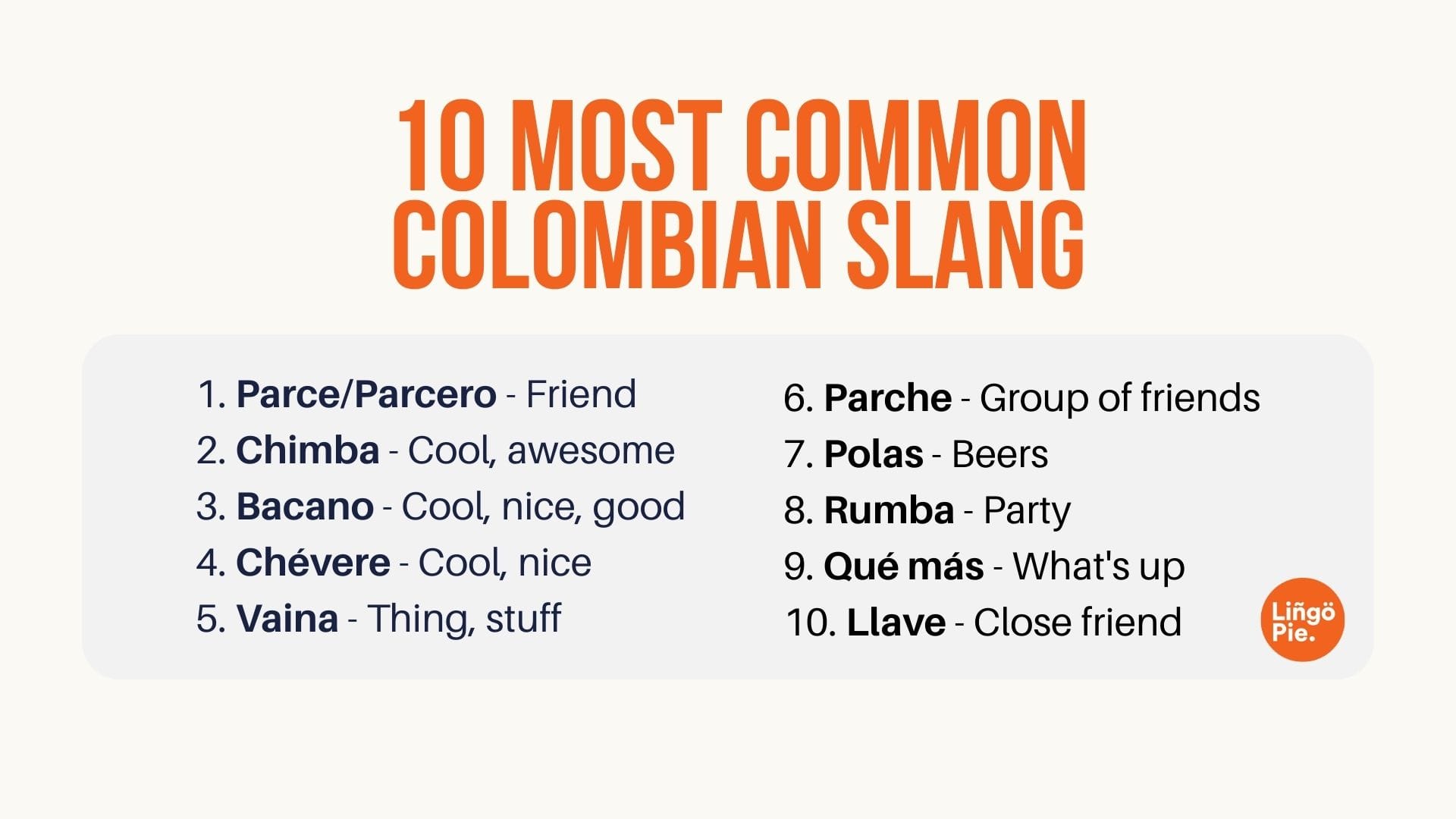
Paisa originally refers to people from Colombia's Antioquia region, especially around Medellín, known for their distinctive accent and warm personality. These days, Colombians worldwide use it as a friendly term for any fellow Colombian they meet abroad. Learning colombia slang like this helps you understand the culture that shapes these conversations.
1. Qué Hubo
"Qué Hubo" (often contracted as "Quiubo" or "Quihubo") is a very common Colombian slang greeting that literally means "What was there?" but is used just like "What's up?" or "Hi" in casual conversation. It’s friendly, informal, and widely used across Colombia to say hello without expecting a detailed response.
- "¡Qué hubo, parce! ¿Todo bien?"
Translation: "What's up, buddy! Everything good?" - "¿Qué hubo, mi llave? ¿Cómo vas?"
Translation: "Hey, my friend! How’s it going?"
2. Pásame esa Vaina
"Pásame esa vaina" is a very common Colombian slang phrase meaning "Pass me that thing," used when asking for something when the exact name isn’t known or needed—it’s a versatile and casual request.
- "Pásame esa vaina, por favor, que la necesito para arreglar la bicicleta."
(Pass me that thing, please, I need it to fix the bike.) - "No entiendo este aparato, ¿me puedes pasar esa vaina para intentar encenderlo?"
(I don’t understand this device, can you pass me that thing to try turning it on?)
Fun Fact: Colombians use "vaina" to refer to a variety of things, making it an essential slang term in everyday life.
3. Es Una
"Es una" in Colombian slang is typically used as a part of expressions like "Es una nota," meaning "It's awesome" or "It's really cool." It is a casual way to express strong positive agreement or emphasize that something is impressive or enjoyable. It can also be used to wrap up conversations by affirming understanding or agreement in a concise, friendly manner.
- "Ella es una nota bailando."
(She’s awesome at dancing.) - "Esa película es una nota, tienes que verla."
(That movie is awesome, you have to watch it.)
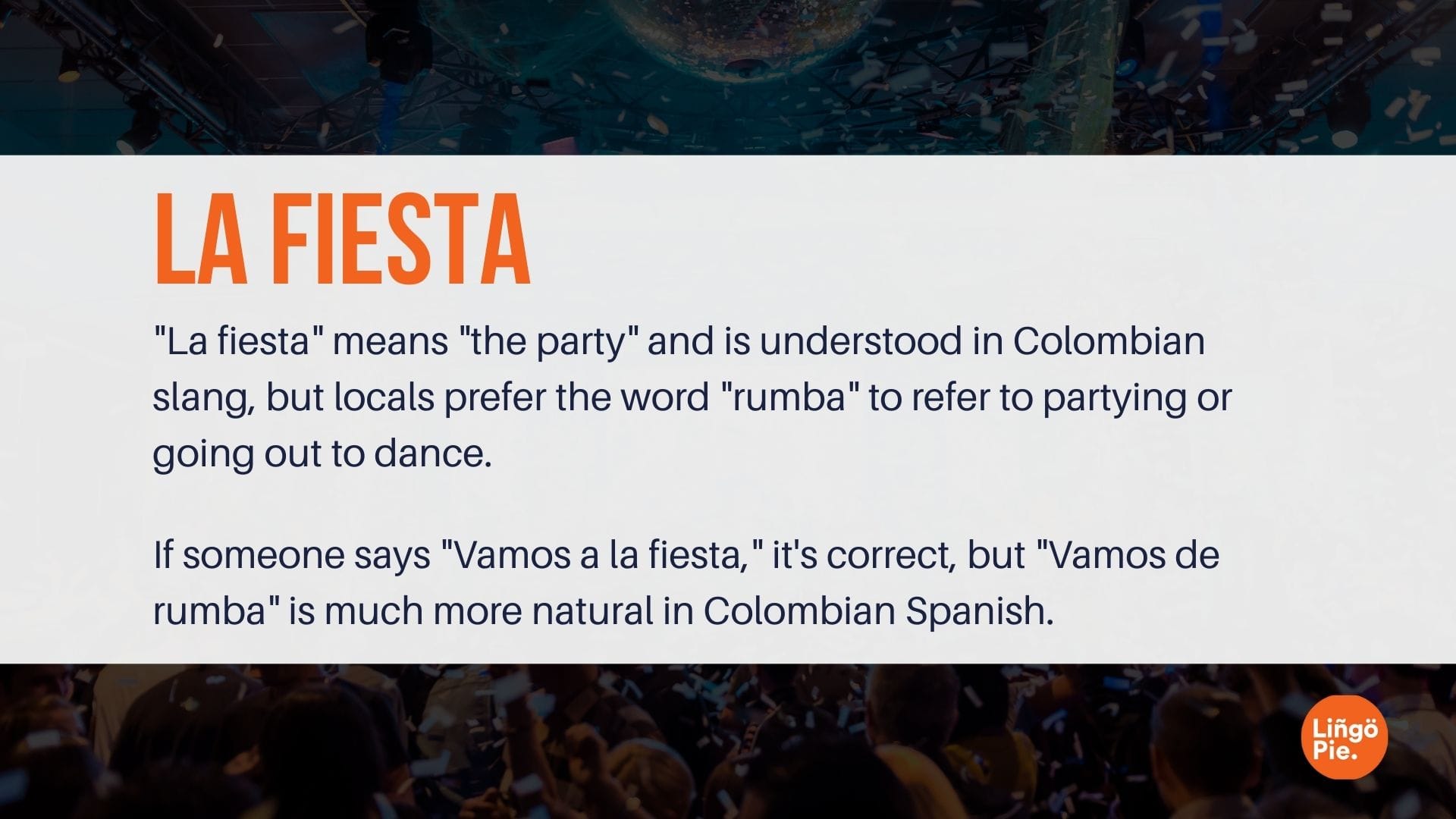
4. La Fiesta
In Colombian slang, "La Fiesta" means "the party" and refers to social gatherings involving music, dancing, and fun. It is commonly used to describe celebrations or nights out with friends.
- "La fiesta estuvo increíble anoche."
(The party was amazing last night.) - "No te vas a perder la fiesta de este fin de semana."
(You’re not going to miss this weekend’s party.)
5. Dar Papaya
"Dar papaya" literally means "to give papaya," but in Colombian slang, it means to put yourself in a vulnerable position or make yourself an easy target for theft, scams, or harm. The phrase "no dar papaya" is commonly used to advise people to be cautious, avoid careless behavior, and not expose themselves to danger.
6. El Parche
"El Parche" in Colombian slang means a group of friends or the crew getting together to do something. It is used to refer to social gatherings, hangouts, or simply your close friend group. Basically, the verb form "parchar" means to hang out with your "parche" or friends.
- "¿Qué vamos a hacer? ¿A dónde salimos con el parche?"
(What are we going to do? Where are we going out with the crew?) - "El parche se reunió anoche para una rumba."
(The crew got together last night for a party.)
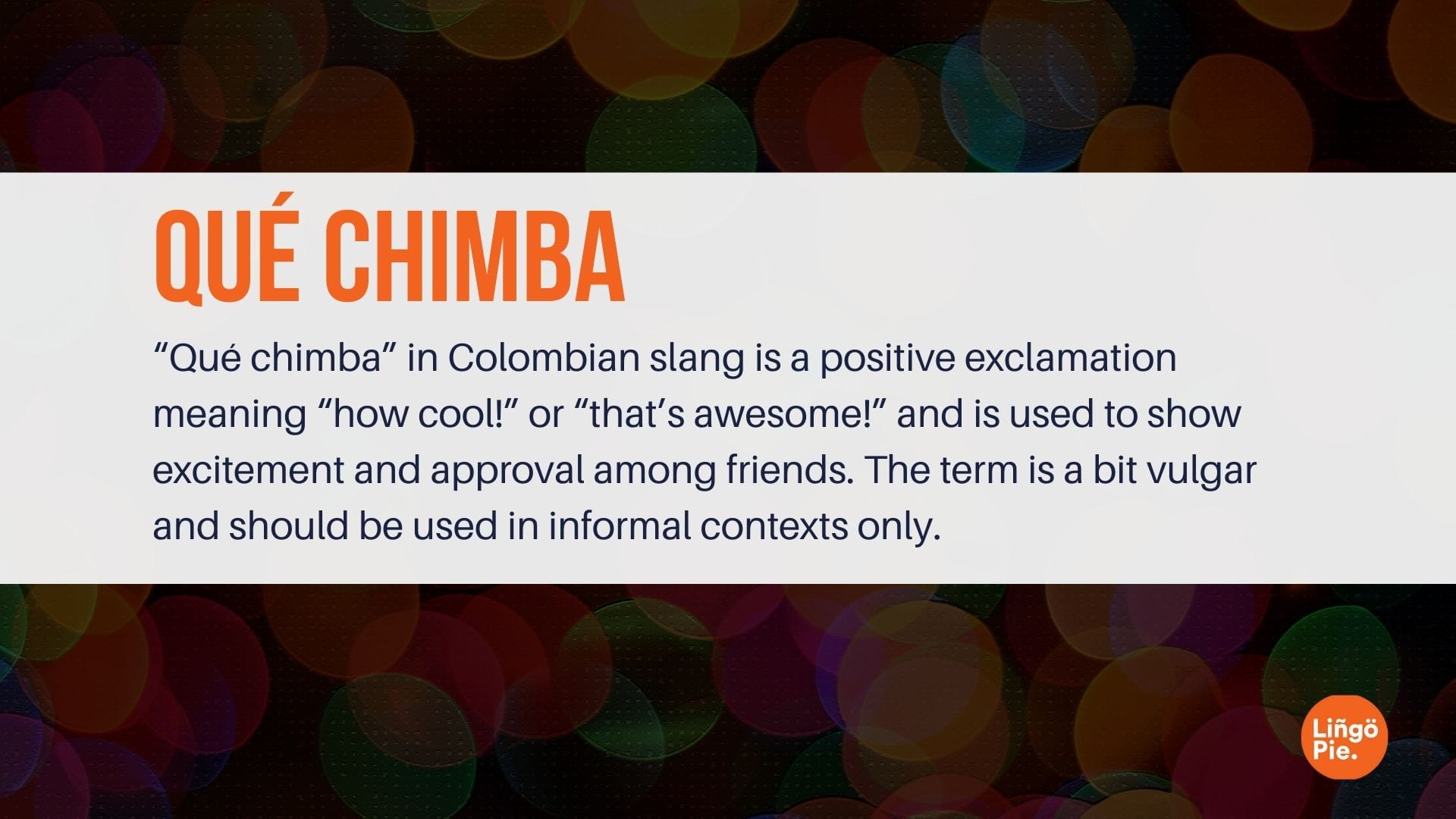
7. Qué Chimba
In Colombian slang, "Qué chimba" is an enthusiastic expression meaning "how cool!" or "that's awesome!" It is used to show excitement or approval about a person, event, or thing, and is very common in informal conversations.
- "¡Qué chimba de fiesta anoche, nos divertimos mucho!"
(What an awesome party last night, we had so much fun!) - "¡Qué chimba tu bicicleta nueva, se ve increíble!"
(Your new bike is so cool, it looks amazing!)
8. Esa Vaina
In Colombian slang, "Esa vaina" is a versatile phrase where "vaina" means "thing" or "stuff." It can refer to an object, situation, or concept when the specific name is unknown or unnecessary. Given its versatility, the phrase is commonly used in everyday Colombian speech as a catch-all for many situations.
- "¿Pásame esa vaina, por favor."
(Pass me that thing, please.) - "No me gusta esa vaina que estás haciendo."
(I don’t like that thing you’re doing.)
9. Muy Bien
"Muy bien" in Spanish means "very good" or "very well." It is commonly used to express approval, agreement, or that something is done correctly and satisfactorily. It can be used to respond positively, like saying "Alright" or "Okay, great!" in conversation.
- "Hiciste un trabajo muy bien."
(You did a very good job.) - "¿Quieres ir al cine? — Muy bien, me parece perfecto."
(Do you want to go to the movies? — Very well, sounds perfect.)
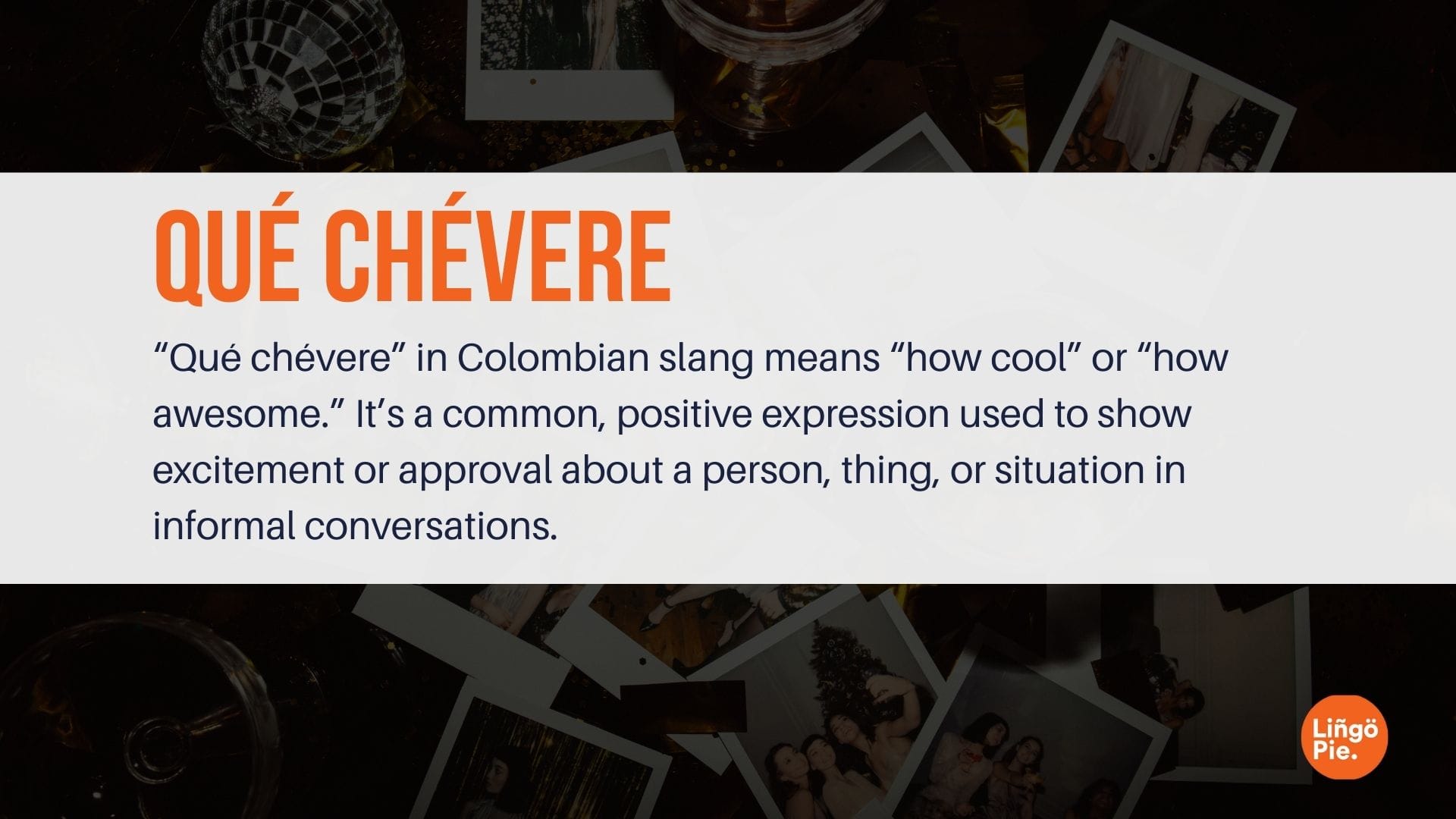
10. Qué Chévere
“Qué chévere” means “how cool!” or “how awesome!” in Colombian slang. It is used to express delight, admiration, or approval in informal conversations.
- "¡Qué chévere ese concierto, me encantó!"
(That concert was so cool, I loved it!) - "¿Vas a venir a la fiesta? — ¡Qué chévere, ahí nos vemos!"
(Are you coming to the party? — Awesome, see you there!)
11. La Chimba
In Colombian slang, "La Chimba" is a strong expression used to mean "no way!" or "unbelievable!" but it can also mean something cool, awesome, or impressive depending on the context and tone. It is informal and often used among friends.
- "¡La chimba, ganamos el partido!"
(No way, we won the game!) - "Esa fiesta estuvo de la chimba."
(That party was awesome.)
12. Papayear
In Colombian slang, "Papayear" means to put yourself in a vulnerable or risky situation—similar to "dar papaya," which warns against exposing oneself to danger or trouble. It is often used to caution someone about being careless or attracting unwanted attention that could lead to problems.
- "No papayees dejando el celular en la mesa."
(Don’t make yourself vulnerable by leaving your phone on the table.) - "Si papayeas en esta zona, te pueden robar."
(If you put yourself at risk in this area, you could get robbed.)
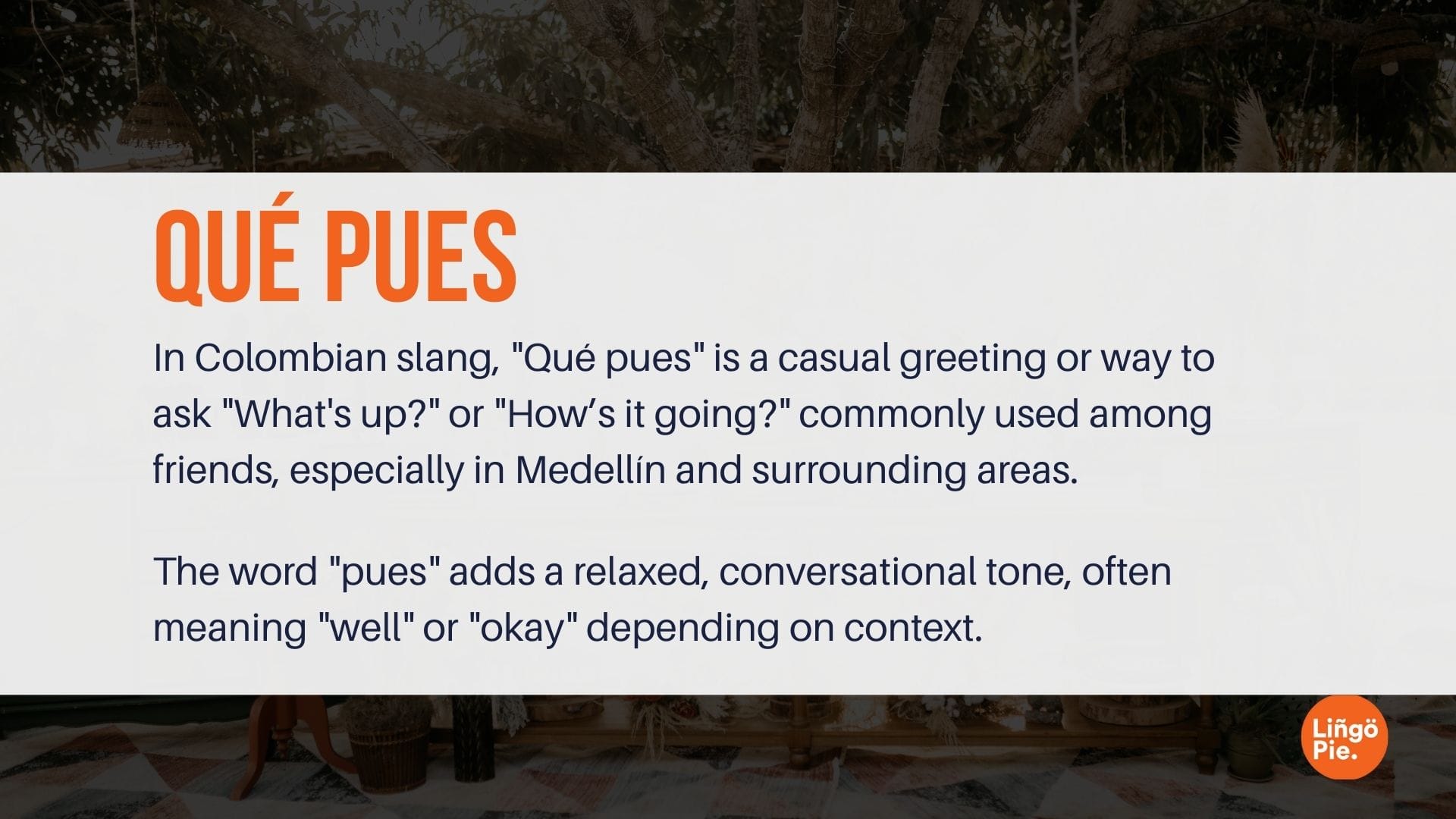
13. Qué Pues
In Colombian slang, "Qué pues" is a casual, friendly way to say “What’s up?” or “How's it going?” It’s often used among friends as a relaxed greeting. The word "pues" adds a conversational tone that softens or emphasizes the question depending on context.
- "¡Qué pues, parcero! ¿Todo bien?"
(What’s up, buddy! Everything good?) - "¿Qué pues? ¿Vas a la fiesta esta noche?"
(What’s up? Are you going to the party tonight?)
14. Chévere
In Colombian slang, "Chévere" means cool, great, or awesome. It is used to describe anything positive, enjoyable, or impressive. The term is very common and versatile in informal conversations.
- "¡Qué chévere tu camiseta nueva!"
(Your new T-shirt is so cool!) - "La fiesta estuvo chévere anoche."
(The party was awesome last night.)
15. Qué Más
In Colombian slang, "Qué más" is a common informal greeting meaning "What’s up?" or "How’s it going?" It is used to ask how someone is and to start or continue a conversation casually.
- "Hola, ¿qué más? ¿Cómo has estado?"
(Hi, what’s up? How have you been?) - "¿Qué más, parcero? ¿Todo bien?"
(What’s up, buddy? Everything good?)
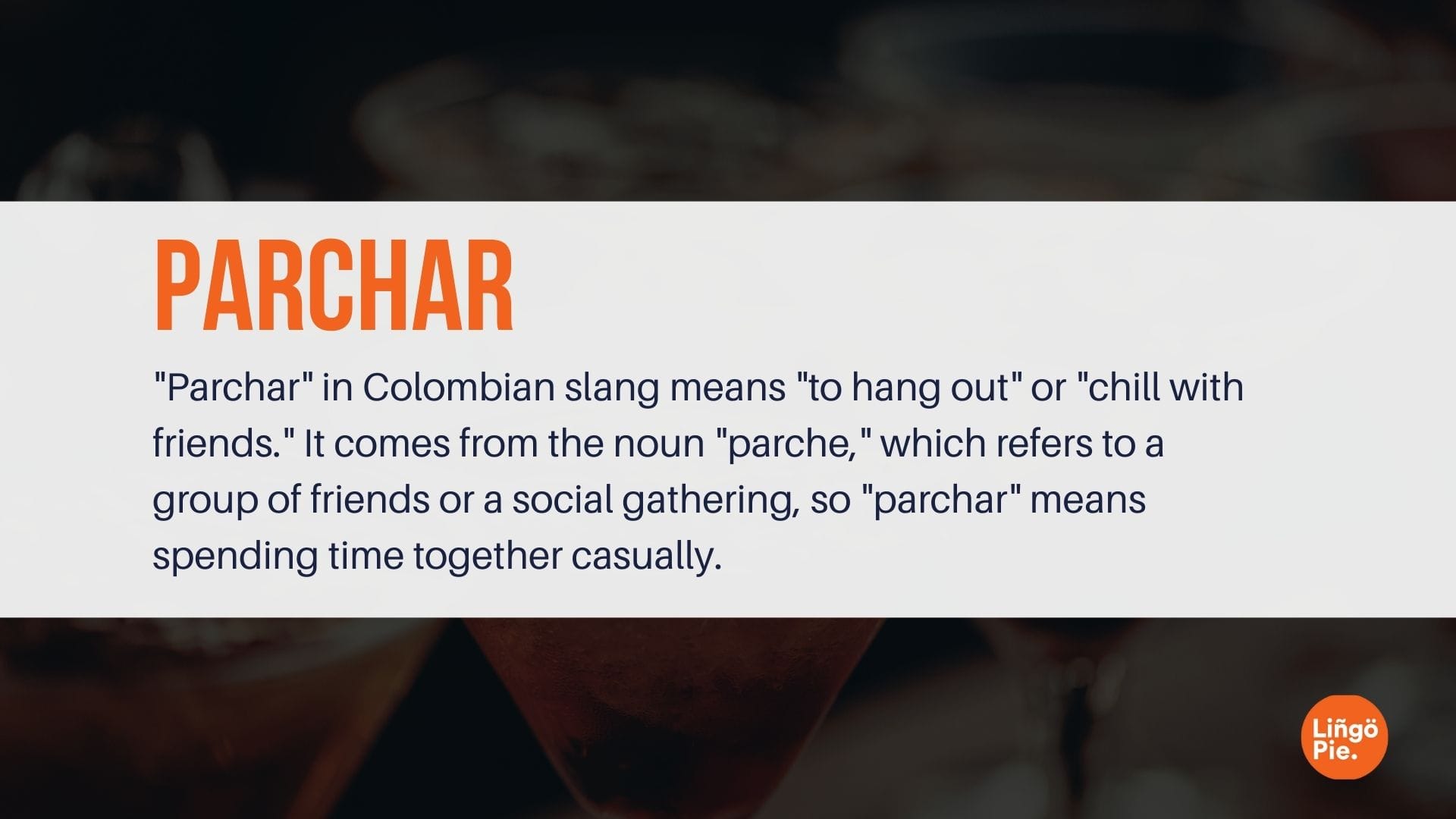
16. Parchar
In Colombian slang, "parchar" means to hang out, chill, or spend time with friends. It is derived from the noun "parche," which refers to a group of friends or a social gathering. It’s commonly used among young people to describe casual socializing and relaxing together.
- "Vamos a parchar en el parque esta tarde."
(We’re going to hang out in the park this afternoon.) - "¿Quieres parchar en mi casa después del trabajo?"
(Do you want to hang out at my house after work?)
17. Estar a la Vuelta
In Colombian slang, "Estar a la vuelta" means to be nearby or just around the corner. It can also imply being close by or easily reachable in a physical sense. The phrase can be used casually to indicate proximity or that someone or something is very close.
- "Estoy a la vuelta, llego en cinco minutos."
(I’m just around the corner, I’ll be there in five minutes.)
18. Chino
In Colombian slang, "Chino" means friend or buddy, especially in casual conversation among young people. While it literally means "child" or "kid," it is frequently used to refer affectionately to a close friend, similar to saying "dude" or "pal" in English.
- "Mi chino nos ayudó con el proyecto y quedó genial."
(My buddy helped us with the project and it turned out great.) - "Vamos juntos, chino."
(Let's go together, friend.)
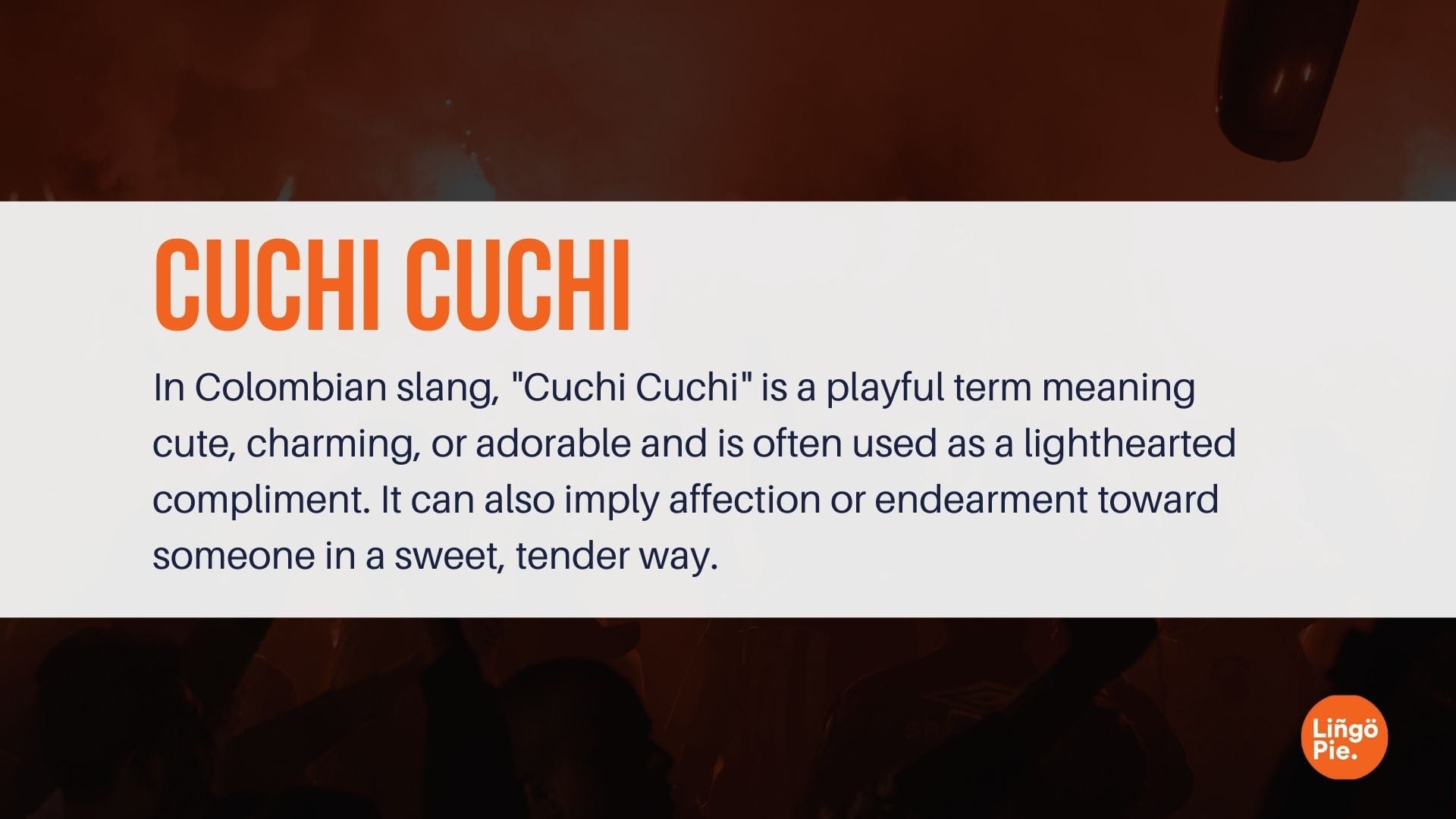
19. Cuchi Cuchi
In Colombian slang, "Cuchi Cuchi" is a playful, affectionate term meaning cute, charming, or endearing. It is often used as a tender compliment for someone's appearance or actions. It can also have a lighthearted, flirtatious connotation depending on context, sometimes implying intimacy or fondness.
- "¡Qué cuchi cuchi estás con ese vestido!"
(You look so cute in that dress!) - "Ella es muy cuchi cuchi cuando sonríe."
(She’s very charming when she smiles.)
20. Chismoso/Chismosa
In Colombian slang, "Chismoso" (male) / "Chismosa" (female) means a person who gossips a lot or someone who likes to spread rumors. It refers to someone who is curious about others' private matters and often shares or talks about them.
- "No seas chismosa, mejor ocúpate de tus cosas."
(Don’t be so gossipy, better mind your own business.) - "Ese dude es muy chismoso, siempre sabe todo antes que nadie."
(That guy is very gossipy, he always knows everything before anyone else.)
21. Hablar hasta por los Codos
The phrase "Hablar hasta por los codos" means to talk a lot or to talk excessively. It is used when someone speaks continuously, often without stopping, sometimes even saying things that are not very relevant.
Origin-wise, it is thought that when someone talks so much, they might end up nudging the listener with their elbows to get their attention, hence the reference to "codos" (elbows).
- "María habla hasta por los codos, no para de contar historias."
(María talks a lot, she never stops telling stories.) - "No hables tanto, estás hablando hasta por los codos."
(Don’t talk so much, you’re talking nonstop.)
Colombian Curse Words
Compared to other Spanish-speaking countries, Colombians don't swear much and often try to replace curse words with milder alternatives when expressing frustration. In fact, swearing is considered very rude, especially if it comes from non-native speakers.
However, you need to learn Colombian curse words because understanding them helps you recognize when conversations turn serious or when someone's genuinely upset versus just being playful. You’ll also hear these words in movies, music, and casual conversations, so knowing their meaning prevents confusion about context and tone.
Hijueputa
The most popular curse in Colombia, a contraction of "hijo de puta" (son of a bitch) that can mean almost anything depending on context—from "dude" to expressing amazement
Gonorrea
Literally means "gonorrhea" but used to call someone a bad or mean person; very common but should only be used around friends
Marica
Originally a homophobic slur, now commonly used among close friends like "dude," but context is crucial as it can still be offensive
Malparido/Malparida
Literally "badly born," equivalent to "bastard" and used for someone who's a really bad person
Güevón/Huevón
Derived from testicles, means silly, dumb, or slow person; form of treatment showing extreme confidence among friends
Carechimba
Vulgar combination meaning "face of vagina," used as an insult
Caremonda
Similar to carechimba, literally "face of penis," used to insult someone
Sapo
Literally "toad," used to call someone gossipy or a snitch
Ñero
Can mean buddy/partner, but also refers to someone perceived as lower class or involved in criminal activities
Pirobo
Originally meant someone from a poor family, now means idiot or fool
Remember that Colombian bad words carry more weight here than elsewhere. Some Colombians will find it funny to hear foreigners use these terms, but others will look surprised or even offended. Save these expressions for close friends who know your intentions, and when in doubt, stick to the countless milder Colombian slang terms that won't risk damaging relationships.
How To Learn Colombian Slang With Lingopie
Mastering Colombian slang requires more than memorizing dictionary definitions—you need to hear how parce, chimba, and vaina sound in real conversations. Lingopie provides authentic Colombian content where slang flows naturally, giving you the context and cultural nuances that make these expressions truly meaningful.
Start with Colombian Content
Choose Colombian TV shows, movies, or music videos on Lingopie's platform. Focus on genres like telenovelas or urban series where characters use everyday slang frequently.
Use Interactive Subtitles

Click on unfamiliar slang words like parce or chimba as you watch. Lingopie's subtitles provide instant translations and cultural context, so you understand both meaning and usage.
Replay Key Scenes
When you hear slang phrases, rewind and listen multiple times. Pay attention to tone, facial expressions, and context to grasp the emotional weight behind words.
Practice with Different Regions
Watch content from Bogotá, Medellín, and the coast to hear regional variations in slang usage and pronunciation.
Lingopie's immersive binge-watching approach beats traditional language learning because you're absorbing slang the same way Colombians do. With consistent practice on Lingopie, you'll start recognizing when someone's joking around with marica or expressing genuine excitement with ¡Qué chimba!, making your Spanish sound authentically Colombian.

Ready to Actually Use These Words?
Learning Colombian slang isn't just about impressing people (though you definitely will). It's about having real conversations instead of sounding like you're reading from a phrase book. If this article inspired you to learn further, then you better try Lingopie!
Instead of drilling vocabulary cards, Lingopie let's you watch Colombian shows and movies where people actually use these terms naturally. You'll hear the tone, catch the timing, and start understanding when "bacano" hits different than "chévere." Plus, you can pause, replay, and practice until these words feel as natural as saying "hello."
Lingopie is like having a Colombian friend teach you...except you can rewind them when they talk too fast!
FAQs
In this section, we provide answers to commonly asked questions about Spanish in Colombia and other Spanish-speaking countries.
What is the Colombian slang for friend?
Parce (short for "parcero") is the most common Colombian slang word for friend. It's used like "dude," "mate," or "bro" and you'll hear it in almost every informal conversation between young Colombians. You can use it to directly address your friend ("¿Qué más parce?" means "What's up, dude?") or talk about your friends ("los parceros" means "the gang").
What is the slang for Colombians?
In Latin America, you will hear the word "Paisa" as a slang word for Colombians.
How do you say girl in Colombian slang?
In Colombian slang, you might hear "Chica" or "Niña" when referring to a girl, adding a touch of familiarity and warmth to the term.
What does listo mean in Colombia?
In Colombia, "listo" means "ready" or "prepared." It's commonly used to indicate readiness for a task or situation. However, if used with the verb ‘ser’ it can refer to being intelligent.
How do Colombians say "dude"?
Colombians might use the colloquial term "Man" or "Parce" to refer to a friend or acquaintance, equivalent to saying "dude" in English.




![Is Portuguese Hard To Learn? Honest Opinion + Tips [2026]](/blog/content/images/2025/09/Portuguese-hard-to-learn.jpg)




![How to Learn Spanish as An Adult [Guide]](/blog/content/images/size/w300/2025/12/How-to-Learn-Spanish-as-An-Adult.jpg)